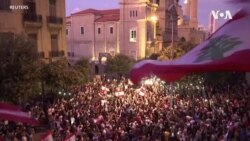ເວລາໂຣກລະບາດໄດ້ກະທົບໃສ່ພາກພື້ນຕາເວັນອອກກາງ, ການປະທ້ວງ ຂະໜາດໃຫຍ່ໃນປະ ເທດ ເລບານອນ ແລະ ອີຣັກ ສ່ວນໃຫຍ່ແມ່ນໄດ້ຖືກສະຫຼາຍໄປ ໃນຂະນະທີ່ລັດຖະບານຂອງທັງ ສອງປະເທດ ໄດ້ກຳນົດມາດຕະການ ກັກບໍລິເວນທີ່ເຄັ່ງຄັດ. ແຕ່ຫຼາຍເດືອນຕໍ່ມາ, ຜູ້ປະທ້ວງຈຳ ນວນຫຼາຍໄດ້ກັບຄືນໄປໂຮມກັນຢູ່ຖະໜົນ, ເຊິ່ງເຂົາເຈົ້າ ແມ່ນທຸກຍາກກວ່າ ແລະໂມໂຫ ກວ່າແຕ່ກ່ອນ. ແລະຄືກັບຜູ້ປະທ້ວງໃນ ສະຫະລັດ ແລະ ທົ່ວໂລກນັ້ນ, ຄວາມບໍ່ເທົ່າທຽມກັນຢ່າງຫຼວງຫຼາຍ ແມ່ນຈຸດສູນກາງຂອງຄວາມບໍ່ພໍໃຈຂອງເຂົາເຈົ້າ. ນັກຂ່າວວີໂອເອ ເຮເທີ ເມີດັອກ, ມີລາຍງານຈາກນະຄອນ ອິສຕານບູລ ປະເທດ ເທີກີ ພ້ອມກັບ ອາລີ ເຄເດີ ຈາກນະຄອນຫຼວງ ເບຣຸດ ປະເທດ ເລບານອນ, ເຊິ່ງ ພຸດທະສອນ ຈະນຳລາຍລະອຽດມາສະເໜີທ່ານໃນອັນດັບຕໍ່ໄປ.
ລະດູໃບໄມ້ຫຼົ່ນທີ່ຜ່ານມາ, ການປະທ້ວງຂະໜາດໃຫຍ່ ໄດ້ເກີດຂຶ້ນໃນທົ່ວປະ ເທດ ເລບານອນ. ມັນໄດ້ແກ່ຍາວເປັນຫຼາຍເດືອນ ດ້ວຍການໂຮມຊຸມນຸມໃນ ເວລາກາງເວັນ ແລະ ມັກຈະປະທະກັນໃນຕອນກາງຄືນ.
ຕອນນີ້, ຫຼັງຈາກການກັກບໍລິເວນຫຼາຍເດືອນ, ພວກປະທ້ວງ ແລະ ຄວາມຮຸນ ແຮງແມ່ນໄດ້ກັບຄືນມາສູ່ຖະໜົນ. ປະຊາຊົນໃນທ້ອງຖິ່ນເວົ້າວ່າ ໂຣກລະບາດ ໄດ້ເຮັດໃຫ້ບັນຫາທີ່ຮຸນແຮງຢູ່ແລ້ວ ທຳ ລາຍປະເທດ, ຕອນນີ້ເຂົາເຈົ້າແມ່ນຢູ່ ໃນວິກິດການທາງເສດຖະກິດທີ່ຮ້າຍແຮງທີ່ສຸດ ໃນຫຼາຍທົດສະວັດ.
ທ່ານ ອາບູ ອາເມັດ, ຜູ້ອາໄສຢູ່ນະຄອນຫຼວງ ເບຣຸດ ໄດ້ກ່າວວ່າ “ພວກເຮົາ ໄດ້ສູນເສຍເງິນທີ່ໄດ້ສະສົມໄວ້ຕະຫຼອດຊີວິດຂອງພວກເຮົາ. ຂ້ອຍບໍ່ຮູ້ຈັກວ່າ ພວກເຮົາຈະເຮັດຫຍັງ.”
ປະຊາຊົນໄດ້ຖິ້ມໂທດການສໍ້ລາດບັງຫຼວງໃສ່ຜູ້ທີ່ມີຕຳແໜ່ງສູງທາງການເມືອງ ສຳລັບການເຮັດໃຫ້ຊົນຊັ້ນທຸກຍາກຂະຫຍາຍຕົວຢ່າງໄວວາ.
ອົງການຄວາມໂປ່ງໃສສາກົນ ເວົ້າວ່າ ລະບົບການປົກຄອງຂອງ ເລບານອນ ຈະປົກປ້ອງບຸກຄົນທີ່ສໍ້ລາດບັງຫຼວງ ແລະ ປະຊາຊົນຂອງເຂົາເຈົ້າເກືອບ 90 ເປີເຊັນຄິດວ່າ ບັນຫາດັ່ງກ່າວ ແມ່ນຖືກແກ້ໄຂຢ່າງຂີ້ຮ້າຍຫຼາຍ.
ບັນດານັກວິເຄາະເວົ້າວ່າ ຖ້າບໍ່ມີການແກ້ໄຂຢ່າງວ່ອງໄວ, ເລບານອນ ແມ່ນ ມີຄວາມເປັນໄປໄດ້ວ່າ ຈະເກີດເຫດການຄວາມຮຸນແຮງ ຍິ່ງກວ່າເກົ່າ.
ທ່ານ ຮາຍໂກ ວິມເມັນ, ຈາກກຸ່ມວິກິດການສາກົນ ກ່າວວ່າ “ເຫດການຄວາມ ຮຸນແຮງທັງໝົດທີ່ພວກເຮົາມີໃນ 6 ເດືອນ ຫຼື ປະມານນີ້ ນັບຕັ້ງແຕ່ການປະ ທ້ວງໄດ້ເລີ່ມຂຶ້ນ ມັນໄດ້ມີສ່ວນກ່ຽວຂ້ອງໂດຍກົງຕໍ່ການຫຼຸດລົງຂອງຄ່າສະກຸນ ເງິນຢ່າງກະທັນຫັນ ແລະ ຕໍ່ມາປະຊາຊົນກໍໃຈຮ້າຍຫຼາຍ.”
ໃນປະເທດ ອີຣັກ, ການປະທ້ວງຫຼາຍເດືອນໄດ້ເລີ່ມຂຶ້ນເມື່ອເດືອນຕຸລາທີ່ຜ່ານ ມາ ແລະ ໄດ້ນຳໄປສູ່ການເສຍຊີິວິດຂອງປະຊາຊົນຫຼາຍຮ້ອຍຄົນ.
ປັດຈຸບັນນີ້, ຜູ້ປະທ້ວງບາງຄົນຍັງຄອບຄອງຈະຕຸໃນລັດຕົວເມືອງຕ່າງໆ ໃນຂະ ນະທີ່ຄົນອື່ນໄດ້ຢູ່ບ້ານຍ້ອນໂຣກລະບາດ. ການໂຮມຊຸມນຸມ ແລະ ການປະທະ ກັນ ບາງຄັ້ງບາງຄາວ ແມ່ນຍັງດຳເນີນສືບຕໍ່ໄປ.
ນາຍົກລັດຖະມົນຕີຄົນໃໝ່, ທ່ານ ມຸສຕາຟາ ອາລ-ຄາດີມີ, ໄດ້ສັນຍາທີ່ຈະປະ ຕິບັດຕາມການຮຽກຮ້ອງບາງອັນ, ໂດຍເວົ້າວ່າ ທ່ານຈະປ່ອຍຕົວນັກເຄື່ອນໄຫວ ທີ່ຖືກຂັງຄຸກ, ຕໍ່ສູ້ກັບການສໍ້ລາດບັງຫຼວງ, ວາງແຜນການເລືອກຕັ້ງໃໝ່ ແລະ ຕໍ່ສູ້ກັບວິກິດການດ້ານການເງິນ ແລະ ຄວາມປອດໄພຢູ່ໃນປະເທດ.
ແຕ່ພວກນັກເຄື່ອນໄຫວແມ່ນມີຄວາມສົງໄສ, ໂດຍເວົ້າວ່າ ຫຼັງຈາກການພະຍາ ຍາມທີ່ປະສົບຄວາມລົ້ມແຫຼວ 17 ປີເພື່ອສ້າງປະຊາທິປະໄຕທີ່ຍຸຕິທຳນັ້ນ, ເຂົາ ເຈົ້າຈະຢູ່ຖະໜົນຈົນກວ່າທັງໝົດນີ້ ຈະເກີດຂຶ້ນ.
ແລະ ບັນດານັກວິເຄາະໄດ້ກ່າວເພີ່ມເຕີມວ່າ ມັນບໍ່ໄດ້ມີແຕ່ຜູ້ປະທ້ວງເທົ່ານັ້ນ ທີ່ຮຽກຮ້ອງຄວາມຍຸຕິທຳດ້ານເສດຖະກິດ.
ດຣ. ເຣນາດ ແມນຊົວ, ຈາກອົງການ ຊາແທັມ ຮາວສ໌ (Chatham House) ໄດ້ກ່າວວ່າ “ຄວາມຮູ້ສຶກ ກ່ຽວກັບ ຄວາມໝົດສັດທາ ແລະ ຄວາມທໍ້ແທ້ ໄດ້ ກາຍເປັນການອາລະວາດ ແລະ ຄວາມໂມໂຫ, ຂ້າພະເຈົ້າຈະເວົ້າວ່າ ມັນຮູ້ສຶກ ໄດ້ໂດຍພວກຜູ້ປະທ້ວງ ແລະ ປະຊາຊົນຜູ້ທີ່ບໍ່ໄດ້ໄປເຕົ້າ ໂຮມກັນຢູ່ຖະໜົນ. ມັນຖືກຍອມຮັບໂດຍທົ່ວໄປໃນສັງຄົມວ່າ ພວກຜູ້ນຳຜູ້ທີ່ໄດ້ມາ ເພື່ອນຳເອົາປະ ຊາທິປະໄຕມາສູ່ ອີຣັກ ແລະ ການປົກຄອງໃນປີ 2003 ແມ່ນຍັງບໍ່ໄດ້ເຮັດມັນ ເທື່ອ.”
ອີຣັກ ແມ່ນປະເທດທີ່ອຸດົມຮັ່ງມີໄປດ້ວຍນໍ້າມັນ ບ່ອນທີ່ອັດຕາຄວາມທຸກຍາກ ແມ່ນຄາດວ່າຈະເພີ່ມຂຶ້ນເຖິງ 40 ເປີເຊັນໃນປີນີ້, ອີງຕາມອົງການ ສະຫະປະ ຊາຊາດ.
ເຂົາເຈົ້າກຳລັງຕໍ່ສູ້ກັບລາຄານໍ້າມັນທີ່ຕົກລົງ ແລະ ໄພຂົ່ມຂູ່ກັບການກັບຄືນມາຂອງພວກຫົວຮຸນ ແຮງລັດອິສລາມ.
ພວກນັກເຄື່ອນໄຫວໃນ ອີຣັກ ແລະ ເລບານອນ ເວົ້າວ່າເຂົາເຈົ້າກຳລັງລໍຖ້າໃຫ້ ໂຣກລະບາດບັນ ເທົາລົງ ສະນັ້ນເຂົາເຈົ້າຈຶ່ງສາມາດສືບຕໍ່ການຕໍ່ສູ້ຂອງເຂົາເຈົ້າຢ່າງເຕັມທີ່.
ທ່ານ ຣາອີດ, ຜູ້ອາໄສຢູ່ນະຄອນຫຼວງ ເບຣຸດ ໄດ້ກ່າວວ່າ “ການປະຕິວັດຈະບໍ່ ຢຸດ. ພວກເຮົາຈະກັບອອກໄປຖະໜົນ ແລະ ເອົາສິດທິຂອງພວກເຮົາ.”
ໃນການສະແດງຄວາມສາມັກຄີກັບຜູ້ປະທ້ວງໃນ ສະຫະລັດ ຜູ້ທີ່ໄດ້ລຸກຂຶ້ນຫຼັງ ຈາກການຕາຍຂອງທ້າວ ຈອຣຈ໌ ຟລອຍດ໌ ນັ້ນ, ພວກນັກເຄື່ອນໄຫວ ອີຣັກ, ເລບານອນ ແລະ ອື່ນໆ ແມ່ນໄດ້ເຂົ້າໄປໃຊ້ຄອມພິວເຕີອອນໄລນ໌, ຂຽນຂໍ້ ຄວາມໃນທວິດເຕີວ່າ, “ພວກເຮົາກໍຢາກຫາຍໃຈຄືກັນ.”
ແລະ ໃນຂະນະທີ່ຄວາມຢ້ານກົວໂຣກລະບາດໄດ້ເປີດທາງໃຫ້ການປະທ້ວງ ທີ່ໄດ້ເກີດຂຶ້ນທົ່ວໂລກນັ້ນ, ບັນດານັກວິເຄາະເວົ້າວ່າ ເລບານອນ ແລະ ອີຣັກ, ທັງສອງລັດຖະບານແມ່ນຢູ່ໃນສະຖານະ ການທີ່ບໍ່ດີ, ເຂົາເຈົ້າຕ້ອງໄດ້ທຳການ ປະຕິຮູບຢ່າງຫຼວງຫຼາຍ ຫຼື ປະເຊີນກັບການລົ້ມລະລາຍ.
When the pandemic struck the Middle East, mass protests in Lebanon and Iraq mostly disbanded as both governments imposed strict lockdowns. But in the months that followed, many protesters returned to the streets – poorer and angrier than ever before. And like protesters in the U.S. and around the world, gaping inequalities are at the heart of their grievances. VOA’s Heather Murdock reports from Istanbul with Ali Khedr in Beirut.
Last fall, mass protests broke out across Lebanon. They lasted for months with rallies by day and often clashes at night.
Now, after months of lockdown, protesters and violence are returning to the streets. Locals say the pandemic has deepened the problems already devastating the country, now in its worst economic crisis in decades.
“We lost our life savings. I don’t know what we will do.”
People here blame corruption among the political elite for the country’s rapidly growing impoverished class.
Transparency International says Lebanon’s system protects corrupt individuals and that nearly 90 percent of its citizens think the problem is being addressed badly.
Analysts say that without a rapid solution, Lebanon is likely to grow even more volatile.
“All the incidents of violence that we have in these six months or so since the protests started were directly related to a sudden drop of the value of the currency and then people really angry.”
In Iraq, months of protests started last October and led to hundreds of deaths.
Now, some protesters still occupy city squares while others stay home because of the pandemic. Rallies and sporadic clashes continue.
The new prime minister, Mustafa al-Kadhimi, has promised to meet some key demands, saying he will release jailed activists, fight corruption, plan new elections and fight the financial and security crises gripping the country.
But activists are skeptical, saying after 17 years of failed attempts to build an equitable democracy, they will stay on the streets until all of this happens.
And analysts add that it’s not just protesters calling for economic justice.
“That sense of despair and disillusionment turning into outrage and anger, I would say is felt by both protesters and people who are not in the streets. It’s generally accepted by society that the leaders who came to bring Iraq democracy and governance in 2003 have not done that yet.”
Iraq is an oil-rich country where the poverty rate is expected to increase to 40 percent this year, according to the United Nations.
It is wrestling with collapsed oil prices and the threat of a resurgence of Islamic State militants.
Activists in both Iraq and Lebanon say they are waiting for the pandemic to ease so they can fully resume their fight.
“The revolution will not stop. We will go back to the streets and take our rights.”
In solidarity with U.S. protesters who rose up after the death of George Floyd, activists in Iraq, Lebanon and beyond are online, tweeting, “We also want to breathe.”
And as pandemic fears give way to emerging protests around the world, analysts say Lebanon and Iraq, both governments on the brink, will have to reform significantly or face collapse.





